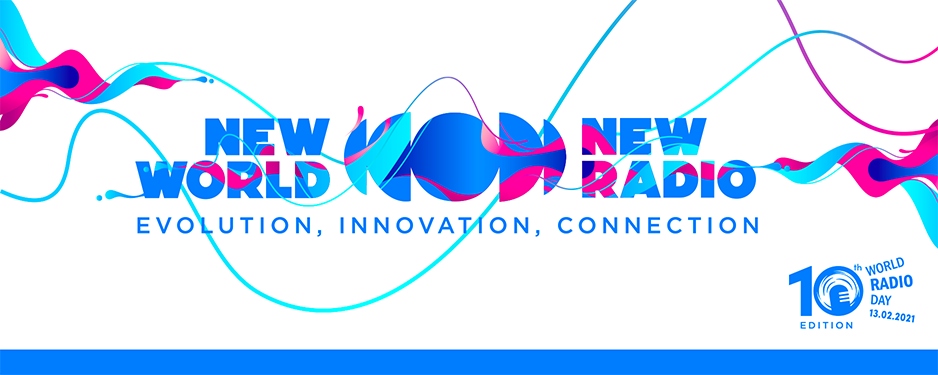World Radio Day 2021 promotes radio’s key role in society
VOV.VN - Radio has always been the most mobile, adaptable and always-available medium and it will continue to be for the foreseeable future, says Olya Booyar, Head of Radio, Asia-Pacific Broadcasting Union (ABU).

Celebrating World Radio Day 2021 (February 13), Olya Booyar shed light on radio’s important role in an interview granted to Voice of Vietnam Radio (VOV). Following the full text of the interview.
Q: World Radio Day 2021’s theme: "New World - New Radio: Evolution, Innovation, Connection". As ABU's Head of Radio, what do you think about this year's topic?
A: World Radio Day 2021 will be both a memorial to all the suffering from COVID-19 and proof that the suffering was not in vain, that we did learn and grow, stronger and smarter.
Last year, many things about humanity changed with the global pandemic, from our individual lives to whole societies. Many old certainties collapsed while some things developed in ways we could not have foreseen. Marvellously, radio seemed to take on a new life. It was not just a background soundtrack to millions isolated in their homes but a lifeline to families, friends and whole communities.
Around the globe people tuned in, older people returning to the medium on which they had been raised, younger people discovering for the first time the interconnectedness that radio could bring, whether live, streamed or podcasted.
For those of use working in the industry, new ways of production developed, new strengths were found, old weaknesses abandoned. Radio people across the spectrum from tiny community stations to big national networks such as Voice of Vietnam found new audiences, fresh ways of working, new joys in that work.
Q: The year 2021 is the 10th anniversary of World Radio Day, what initiatives does ABU implement to call on ABU’s members to celebrate World Radio Day 2021?

A: The ABU is all about diversity, across and within our member organisations all around our region. So I’m confident our members are making wonderful radio programs every day, enjoyed by millions of listeners, so World Radio Day is a chance to proclaim our achievements for the whole world to hear!
The ABU has long been a major partner in promoting and celebrating the achievements of our members through World Radio Day. Like UNESCO, we see it as an occasion for stations and networks to create awareness for the many aspects of radio. We can celebrate on-air, create our own special WRD content, join the conversation on social media (#WorldRadioDay) and encourage our listeners to participate.
We also have a great method of sharing our achievements through the ABU’s Radio Facebook page, so I urge all our members to post their stories on it.
Q: What are the advantages and disadvantages of ABU's radio group? How does ABU Radio group change its operations to enhance effectiveness over the past time?
A: The advantage of the ABU Radio Group is that Radio has its own body within the decision-making framework of the ABU, although a disadvantage is that we only meet once per year and it is difficult to gather everyone’s input, from such a big membership. So many great discussions and wonderful ideas come out of the Radio Group that it seems a shame that they don’t get more publicity and the chance to extend the debates – and the knowledge sharing – more often and more widely.
2020 necessitated a change in everyone’s operations and ABU Radio didn’t disappoint. We continued our work online – delivering dozens of targeted training sessions, webinars, masterclasses and specialist courses that were enjoyed by thousands of colleagues in our membership. We will continue to deliver such services and many new initiatives, online, in person and hybrid, as well as collaborate with our newly launched ABU Media Academy to extend the learning pathways to internationally recognised qualifications with major and world-renowned education providers.
Q: How do you assess the outstanding contributions of the world radio industry in general in times of crisis – especially during current Covid 19 pandemic? Please give some specific illustrative figures if possible.
A: Having worked across all sectors of broadcasting during my career, I have never underestimated the importance of radio in reaching people during crises as well as everyday. In many countries, radio is often seen as the older, less attractive aunt – the British people call the BBC “Aunty” – but I have always felt radio is young, energetic and dynamic. It can do things quickly and with the kind of limited resources that other media such as TV, film and print cannot.
Radio is also a very personal medium – one person speaking to another – and this is so important during crises, when people feel alone and maybe afraid. Radio reaches out to them, tells them that they are not alone. We provide a tailored service that shows that each individual listener is important and that there is someone out there supporting them.
And, of course, we bring joy and cheerfulness, maybe bright music, conversation or drama, during the dark times. This takes people to some happier place away from the crisis they are facing.
On the issue of numbers, radio is so personal and every country’s radio is so different that global figures are almost meaningless. But time after time, from countries as different as Germany or South Africa or Vietnam or Australia or Fiji, surveys and other feedback are showing how radio listening has increased exponentially during the COVID crisis. Listeners are returning to their radio friends in a time of need.
Q: Can you share your predictions about the developmental trend of radio in the future?
A: For many years now we have been predicting that radio will retain its identity but as part of a suite of audio-visual and text-based media. It no longer stands apart either in the way broadcasting organisations are structured and how they work or in the way audiences use them. For example, people expect to be able to get their news from all the media – radio, television, print media, social media and news websites – in a way that best suits what they are doing at the time.
Radio has always been the most mobile, adaptable and always-available medium and it will continue to be for the foreseeable future. While the mobile phone has become a great single device for different media including audio, in many regions, radio is still accessed easily and cheaply, via a transistor radio running on batteries and receiving a signal almost anywhere, in any weather, day or night.
The second important trend is radio as part of social media. In fact, Radio is the first social media that allowed people to listen to and interact with each other. Radio can deliver common content that everyone can hear in the same way at the same time, or it can speak one to one, via podcasts and niche digital offerings. Radio adapts to its listeners needs.
When it is important to get the same message, as it is in times of crises or disasters, radio speaks to all with one voice. Radio can comfort, inform and entertain its audiences on all platforms and listeners trust their radio. We have seen this working during normal times but it has really proved its value during the COVID crisis. It is one of the most exciting times in the history of broadcasting and I firmly believe radio will continue to have a central role to play into the future.

